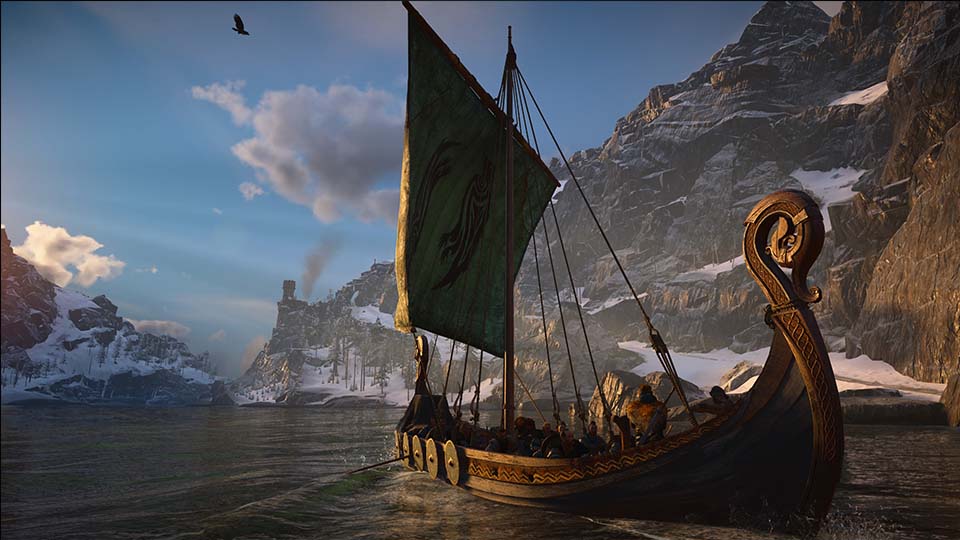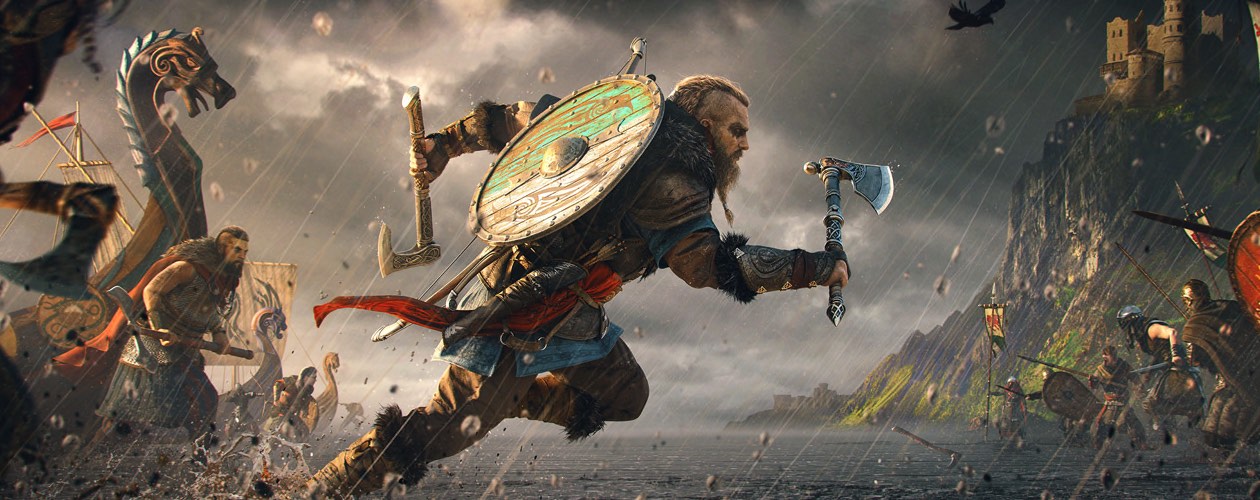In my recent interview with Thierry Noel, historian and inspirational content advisor of the Editorial Research Unit on Assassin’s Creed Valhalla, he explained to me that the way the development team were able to fill in the gaps of Viking history to create a believable game world was to consult with experts. That’s all very well and good, I said to myself – garnering odd looks from my family around the dinner table – but how do even those experts fill the historical gaps? If we have very few historical records about the interactions between Vikings and Anglo-Saxons in 9th Century England, then surely that’s it, right? We know what we know, how do we think we know something that happened without even knowing for sure it happened? Things were getting uncomfortably philosophical in my brain, so I decided to have a chat with Ryan Lavelle – Professor of Early Medieval History at the University of Winchester and consultant on Assassin’s Creed Valhalla – to find out how you research a historical era when there’s precious little record to research.

Ryan, I discovered, was an extremely affable chap, after briefly discussing our children’s Lego collections and his penchant for guitar strumming, I thought I’d get stuck in with some questions. First off, being a historical consultant on Assassin’s Creed Valhalla, what exactly did that entail? “My role was basically as a small cog in the big machine” Ryan humbly responded, “I came in at the inspiration stage when the team came to various locations associated with the Viking age, on this magical mystery tour they were doing from Norway, to York and then on to the Wessex league of the tour, where I was the go-to person for the King Alfred elements.”
“I met with them at Stonehenge” Ryan continued, “and then went on to some other locations in Wessex. They were travelling in two minibuses – very nice minibuses actually – it was kind of a rolling seminar for two days. I was faced with lots of questions from different members of the team. “What would King Alfred be eating for his dinner” kind of thing. Then they headed off with that information and that inspiration. I gather that other experts were brought in at other stages to ask about language and things like that. My role was as the initial contact.”
My journalistic intuition told me that I should follow-up this enquiry and ask “what would King Alfred actually eat for his tea”? But I got distracted and forgot, so we may never know the answer to that question. I really hope the answer would have been burnt griddle cakes. Man, how I want that legend to be true. Anyway, instead, I asked him what questions the development team were asking him during their magical mystery tour? “They were interested in things like life in the courts, questions about “what would a Witan be like?”, the Anglo-Saxon council for example, lots of questions about King Alfred’s life -“. Wait a minute. My journalism sense started tingling. Here was the chance to ask if the burnt cake story was true! I blurted out an interruption to ask the most pressing question of the entire interview; “Is it true?” I stammered, vaguely incoherently, “did King Alfred really burn those cakes?”

Ryan responded with a laugh (though I like to think he was a little taken aback by my insightful questioning style); “Is it true? I like to think it was. It’s a story that develops in the Anglo-Saxon period, so it’s not something that was invented by the Victorians – though the Victorians love that story. It’s something that was told within a couple of generations of Alfred’s lifetime so there’s a kind of currency to it. So it’s recorded in an early medieval source basically.” I’m taking that as a yes.
I suppose I should move on now and actually get into the nitty-gritty; how does a historian tell the history of a period in which there are so few written records? After all, there are so many possibilities of what could have happened, where do you even start? “I think you have to have a lot of information to be a historian of this period,” Ryan told me, “there’s a historian from Oxford University called James Campbell who died a few years ago, he was effectively eluding to the dangers of historians being quiet men with little imagination. The need to try to fill in those gaps of the possibilities, we have our reference points, we’ve got the dates, we’ve got some places, and we’ve got to try to fill in the landscape between.”
“For me, working as a historian of early medieval England, we do have the doomsday book as a record. In the late 11th century the doomsday book provides a record of lots of different estates across England and the sizes of those estates and then if we cross-reference them back to the evidence of documents from the 9th and 10th century then we’re able to piece things together. This must have been an important place, how many miles are there between this estate to the next, how many miles would it take to travel those distances. It then becomes possible to piece together the life of the court from that and the reference points of the landscape itself.”

That must help with finding out about the elites who owned all these estates and were part of the court, but how do find out about everyone else? “Research is often on the elites, the political elites of court culture, the society of people who could get things written down about them. In some ways, a lot of what I research on are the ways that those with power held onto it and those without tried to contest that power. In some ways, I suppose the work I do is part of the problem. There is evidence of ordinary people in work, what ordinary people have to do. The doomsday book provides us with evidence of the lives of ordinary people and work they had to do and the very hierarchical nature of the society that people had to negotiate. I think there is evidence that the elite within society tried to keep the barriers up to prevent people from moving through society.”
“In the later part of the Viking age,” Ryan continued “there was a real concern that there would be social mobility due to people acting as Vikings within themselves. There was an archbishop of York in the early 11th century who complained that if a slave should become a Viking and should kill their master as a result of the upheaval from Viking attacks then what would happen to society? People wouldn’t know their place. In some way, the Viking invasions created huge disorder but for some people, it may have created opportunities to be free as well.”
So, to wrap up, I asked Ryan if there are any Anglo-Saxon stereotypes or myths that he hopes Assassin’s Creed Valhalla will shatter for its players? “The idea of the Anglo-Saxons being this society of free peasant farmers, this peasant commonwealth, is this Victorian myth. And the idea that the army of Alfred would be setting out to war with their pitchforks against the Vikings was a bit of a myth. Looking at the representation of the armies of the West Saxons in AC Valhalla I didn’t see any pitchforks! I hope they’re a bit more on par with the Vikings in that sense. Warrior identity for many different groups in the early middle ages was something of an aristocratic identity. So the idea of armies consisting of peasants is a bit of a myth.”

“I think the other thing” Ryan concluded, “is the diversity of many groups of people is important to bear in mind for the early middle ages. These are people that moved around to many different places. There’s lots of different cultural influences travelling around in the early middle ages too.”
Based on this fascinating research and insight, we can see why the game world of Assassins Creed Valhalla is often quite different from our expectations of this period of history. With every twist and turn of Valhalla’s immense narrative and each step through its expansive world, we can see the influence of Ryan and his fellow historian’s research, and it’s part of why the Assassin’s Creed franchise remains an unmissable and essential part of the gaming landscape.




Dominic L
I love this! Of course, I will mostly remember about King Alfred’s burnt cakes, but I have learnt something.